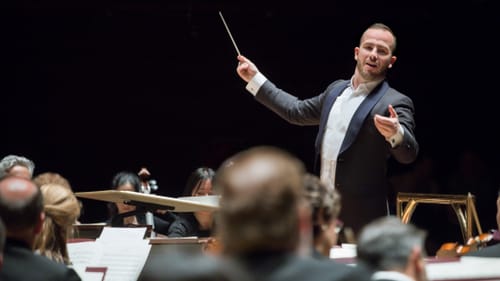Stay in the Loop
BSR publishes on a weekly schedule, with an email newsletter every Wednesday and Thursday morning. There’s no paywall, and subscribing is always free.
Just like Heaven
Philadelphia Orchestra presents 'Rachmaninoff Live!' with Daniil Trifonov

When passionate intensity and intellectual maturity click, the experience can be just this side of paradise. That is exactly what happened at the Philadelphia Orchestra’s Rachmaninoff Live!, featuring pianist Daniil Trifonov and conductor Yannick Nézet-Séguin in performances of two of the most challenging, best-loved works in the piano-orchestra repertoire.
The Friday performance of Rachmaninoff’s Piano Concerto #2 in C minor — popularly known for its “Full Moon and Empty Arms” theme—was recorded live by Deutsche Grammophon. I plan to be one of the first to download this recording.
I think the pressure of being recorded by DG, one of the world’s oldest, largest, and most iconic classical-music labels, kept every participant on their toes from first soft chord to final flourish. Yannick has never been better. Known for bringing an effusive joie de vivre to many masterworks, he kicked it up a notch to a breathtaking level of grandeur and majesty.
But ultimately one person makes or breaks this concerto: the pianist. In the last two years, Trifonov has rocketed to stardom. Still giving the appearance of a shy, diffident prodigy, the 27-year-old Russian-born virtuoso barely made eye contact with the audience when he was shepherded on stage by Nézet-Séguin. But once he touched the keys, he transformed.
Trifonov throws himself into a performance, bouncing on the bench, boyish hair tousled like the lads from Liverpool. Hunched over the keys with an eager smile, or sitting bolt upright, his shoulders writhing as his hands erupt over the high and low registers, his face alternately expresses waves of sorrow and ecstasy. Despite this, Trifonov is not a showman hoping to enhance his playing with visual effects. Those who have watched his evolution on YouTube know he is the real deal, an artist whose physical response is part of the music-making, not a shallow diversion.
For me, his playing was perfection, eclipsing past live performances. Several recording mics dotted the stage, including one right next to the piano. It will be a treat to hear that instrument even more clearly defined, and its heavenly blend with French horns.
Trifonov received a raucous standing ovation and responded by playfully offering his unique take on a Bach Gavotte en rondo, letting us know he was as capable of impish delight as of profound intensity.
And you thought that was good
In the hope of being overwhelmed twice in the same weekend, I returned to Verizon Hall on Sunday for Trifonov’s take on the Rachmaninoff Piano Concerto No. 3 in D minor. Film fans will recognize this work from the film Shine (1997), for which Geoffrey Rush won an Oscar as troubled pianist David Helfgott.

So, was I overwhelmed? You bet! Impossible though it seems, the Rach Third surpassed the Second. There is more meat on the bones of this concerto for a hungry young pianist to gnaw, and gnaw he did.
Although he was not as quick to leap into the spirit of the Third, Trifonov’s physicality soon took over, propelling him across the keyboard in playing that ranged from breathtaking lyricism to powerful explosions of sound and meaning seldom heard on the concert stage.
During the pianist’s solo passages, Nézet-Séguin, the most balletic of conductors, simply stood there, his baton lowered. With a look of awe and wonder on his face, his flicker of a smile seemed to say, “Daniil, you are the man!”
Again, this concerto was being recorded for the DG release, and I can’t imagine the pressure these musicians, pitch-perfect and in synchronicity, experienced. As an audience member, I felt as though I were holding my breath watching an Olympic gymnast overcome one impossible hurdle after another. From gentle touches swimming in a just-right rubato to powerful outbursts I swore would set the piano strings on fire, Trifonov’s playing and partnership with an orchestra that never sounded better created a musical moment as close to perfect as we can ever hope to experience.
All this and Bartok, too
I regret having to reduce the orchestra’s brilliant performance of Bartók’s Concerto for Orchestra to a single paragraph. Suffice it to say that Nézet-Séguin’s regard for structural integrity, sweeping power, and deep feeling carried over into a revealing interpretation of this grand, sometimes grating, always glorious concerto. Play it again, Yannick, and I’ll have more to say next time around.
What, When, Where
Rachmaninoff Live! Daniil Trifonov, piano, Yannick Nézet-Séguin, conductor. The Philadelphia Orchestra. Rachmaninoff Piano Concerto No. 2 in C Minor, Op. 18, (April 12 and 13); Rachmaninoff, Piano Concerto No. 3 in D Minor, Op. 30 (April 14 and 15); Bartók, Concerto for Orchestra, April 12-15, 2018, at the Kimmel Center's Verizon Hall, 300 S. Broad Street, Philadelphia. (215) 893-1999 or philorch.org.
Sign up for our newsletter
All of the week's new articles, all in one place. Sign up for the free weekly BSR newsletters, and don't miss a conversation.

 Linda Holt
Linda Holt